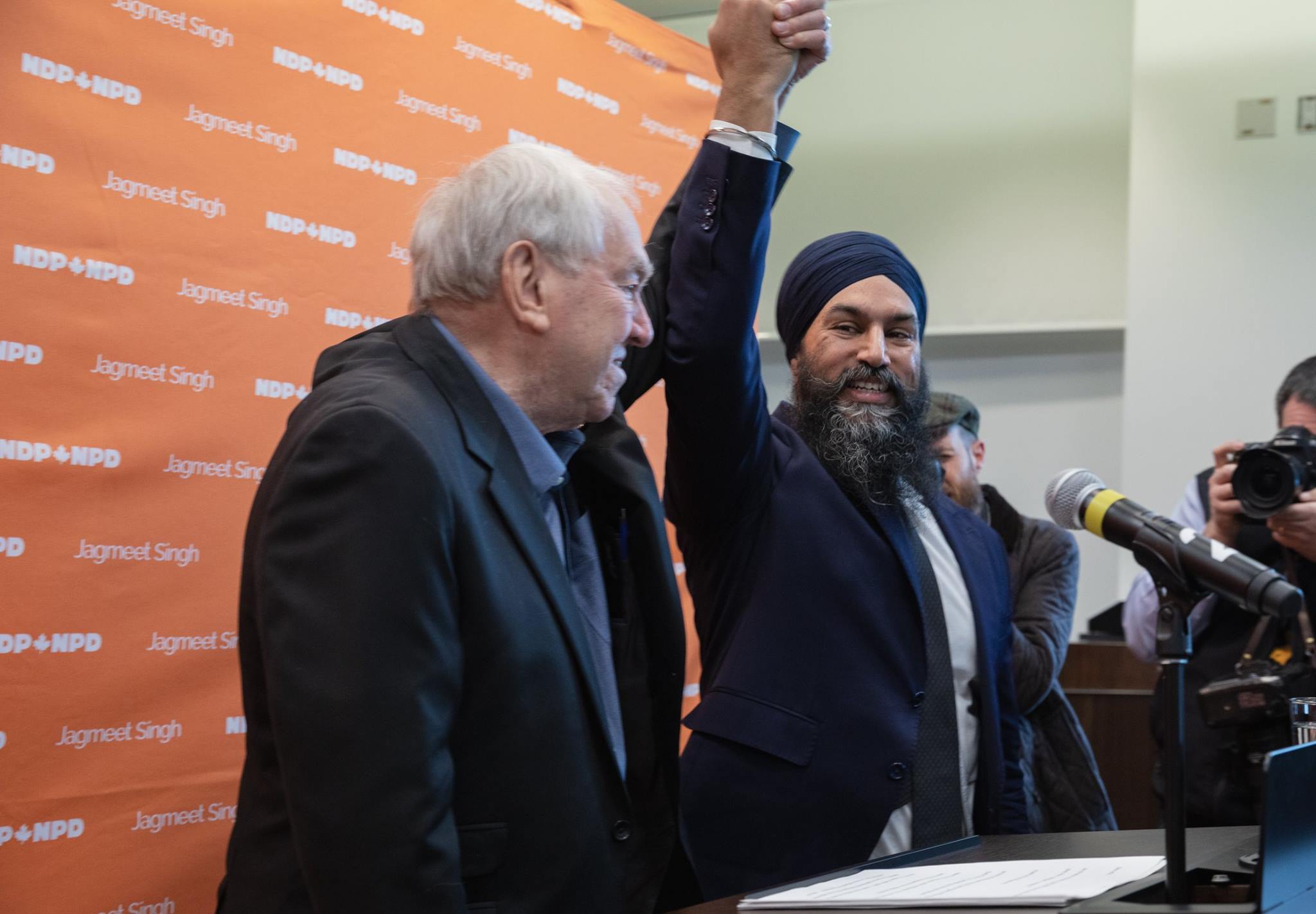NDP leader Jagmeet Singh’s victory in the Burnaby South byelection last week followed an increasingly familiar pattern in electoral politics.
A few months ago, all the talk in the mainstream media was of Singh’s inept leadership and a looming disaster for the NDP. Globe and Mail columnist Gary Mason called Singh’s leadership a “washout.” In the Ottawa Citizen, Andrew McDougall, Stephen Harper’s former communications director, chuckled: “Singh features about as regularly as the third-choice goalie on a last-place NHL team” in conversations about the NDP. Liberal campaign strategist Omar Khan said Singh’s leadership was “doomed in its infancy,” and suggested, “Liberals are praying every night that the NDP doesn’t dump him before the election.” In the National Post, Rex Murphy described Singh as “natty but ineffectual.”
Former NDP leader Tom Mulcair, meanwhile, said it would be “extremely difficult” for Singh to stay on as leader if he lost in Burnaby.
During the byelection, Tory candidate Jay Shin’s campaign distributed orange-branded leaflets urging voters to vote Conservative so as to “save the NDP” from Singh.
But despite months of ridicule, dismissiveness and doubt, Singh secured a win and increased the NDP’s vote share in Burnaby South by almost four points. Former MP Kennedy Stewart won the riding by just over 500 votes in the 2015 general election.
On the other hand, the Liberal and Conservative parties saw their vote shares dip by eight and 4.5 points respectively.
In his victory speech, Singh said “people should be angry” at “a system that puts more and more wealth in fewer and fewer hands.”
The day after his election, he promised to call out the Trudeau government’s concern with “helping the wealthy and powerful, whether it’s SNC-Lavalin or pharmaceutical companies, or oil and gas.”
“We run campaigns in a way where we directly connect with the people, and our offer was better than the other parties,” Singh added.
An emerging trend
The NDP leader’s byelection victory in Burnaby follows an emerging trend: pundits scoff at and ridicule leaders on the left; then the left wins.
Similar scripts have played out in the U.K. and U.S. in recent years.
Throughout 2016, Labour Party leader Jeremy Corbyn was roundly dismissed as “out of touch” and “incompetent.” Former Labour cabinet minister David Miliband called Corbyn “unelectable” and “undesirable.” The Independent’s Tom Peck said Corbyn would take Labour to “electoral oblivion.” Commentator Nick Cohen said Labour would be “slaughtered” at the ballot box. In The Telegraph, Toby Young arrogantly suggested conservatives should buy Labour memberships to vote for Corbyn during the party’s leadership race, with the assumption the veteran socialist would be an electoral disaster for the party.
Then came the 2017 snap election. Up until the eleventh hour, everyone from former primer minister Tony Blair to author J.K. Rowling predicted a landslide win for the Tories.
Instead, Conservative leader Theresa May lost her parliamentary majority, while Labour saw its biggest increase in votes since 1945.
In the U.S., top Democrats regularly cast doubt on Democratic Socialist congresswoman Alexandria Ocasio-Cortez’s competence as an emerging leader of the left.
One patronizingly asked: “Does she want to be an effective legislator or just continue being a Twitter star?” Oregon congressman Kurt Schrader suggested Ocasio-Cortez “doesn’t understand” how Congress works yet. Former Democratic senator Joe Lieberman said: “I certainly hope she’s not the future and I don’t believe she is.”
But the data suggests otherwise. A poll published by The Hill and Harris X found 59 per cent of registered voters support Ocasio-Cortez’s 70 per cent top tax-rate proposal. Another poll found 74 per cent of Democrats and Democratic-leaning voters would vote Ocasio-Cortez for president if they could (she is currently too young to run). The congresswoman also enjoys higher name-recognition and favourability than some Democratic 2020 presidential contenders.
Singh is rarely criticized for being too left-wing in the ways Corbyn and Ocasio-Cortez are, but Singh has shown, like Corbyn and Ocasio-Cortez, he can be a much more effective leader than his critics first predicted.
Organizer and editor Derrick O’Keefe tweeted last week: “Singh hits right themes in his victory speech. Centrism and liberalism can’t stop the rise of the far-right; only democratic socialism can.”
“The NDP need to go left or go home this year,” he added.
With fundraising challenges and modest polling numbers, the federal NDP has a steep mountain to climb ahead of the general election. But the result in Burnaby South shows naysaying from the pundit class is doing little to dampen the momentum of leftist ideas.
If Singh can harness the same kind of progressive energy stoked by Bernie Sanders, Corbyn and Ocasio-Cortez, there’s reason to believe the NDP leader can prove pundits wrong again this fall.
Alex Cosh is a journalist and PhD student based in Powell River, B.C. His work has appeared on PressProgress, Left Foot Forward and in several local publications in B.C.
Photo: Jagmeet Singh/Facebook
Help make rabble sustainable. Please consider supporting our work with a monthly donation. Support rabble.ca today for as little as $1 per month!




